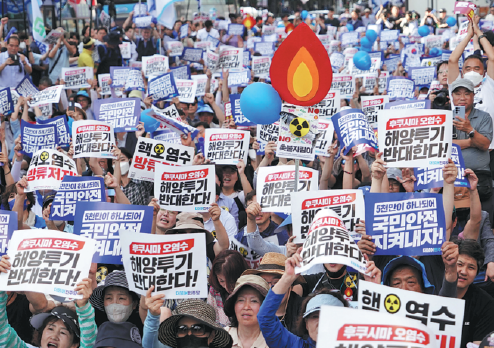Rally protests Japan's nuclear water plan

SEOUL/KUALA LUMPUR — Rallies were staged on Saturday in South Korea as climate groups voiced concern over the Japanese government's moves to go ahead with discharging nuclear-contaminated water into the sea.
South Korea's main opposition Democratic Party held a rally in central Seoul opposing the plan. Nearly 100,000 people took part in the rally, the party said.
Lee Jae-myung, the party chairman, said that if Japan wants to pollute the sea the South Korean government should openly oppose it.
Park Kwang-on, the party's floor leader, called on South Koreans to unite against Japan's plan and unite to safeguard people's lives.
"It makes no sense for Japan, a developed country, to risk the lives of people all over the world (by releasing nuclear-contaminated water into the sea)," said Cho Hanki, a citizen who joined the rally.
Despite opposition from its neighbors and Pacific island countries, Japan remains resolute over its plan to dump radioactive wastewater from the crippled Fukushima Daiichi nuclear power plant into the Pacific Ocean.
Japan's lack of transparency is of grave concern, a Malaysian environment group said.
Considering the risks of nuclear pollution and its impact on countries in Southeast Asia, whose populations depend heavily on fisheries, the president of Friends of Nature Malaysia, Meenakshi Raman, said the unilateral decision by Japan to discharge the nuclear-contaminated water into the sea violated the principles of multilateral dialogue.
"It is indeed unilateral. No discussion whatsoever … Despite all the protests, because there have been protests by civil society, and even(this group), we all had signed on, petitions and everything. Despite all that, the Japanese authorities have gone ahead with this."
The lack of engagement with regional governments and other civil society organizations had drawn suspicion and raised concerns over Japan's decision, she said.
Facing contamination
Despite claims that the water had been treated and considered safe by Tokyo Electric Power Company and Japanese authorities, the lack of engagement with governments whose countries could find themselves facing contamination by heavy metals and other contaminants had brought growing doubts over the safety of the plan, Meenakshi said.
"We eat a lot of seafood and also import quite a lot as well. You just don't know where the contaminants would be going. It's worrying because no one is giving a definite answer, and no one can give you any guarantees of safety."
Meenakshi also stressed that members of the Association of Southeast Asian Nations and the public should be in the loop on studies and assessments about the release plan.
Other local civil society groups and fishing community organizations have expressed their concerns to the Penang Inshore Fishermen Welfare Association, which has voiced objection to the discharge plan.
Greenpeace's East Asia chapter has warned that Fukushima's contaminated water differs from that of other nuclear power plants not only because of its greater variety of radioactive materials but also the much higher radioactivity.
"If it is discharged into the Pacific Ocean it will potentially pose a significant threat to the well-being of human health and marine life," it said.
Japan's nuclear regulator on Friday finished inspecting a newly completed system to release radioactive water into the sea, local media reported.
The Nuclear Regulation Authority checked for leaks and other abnormalities by passing water through the system and inspected emergency shut-off valves to ensure they function properly, the public broadcaster NHK reported.
International Atomic Energy Agency head Rafael Mariano Grossi will visit Japan over four days from Tuesday to meet government leaders and see final preparations for the discharge, officials said on Friday.
Xinhua - Agencies

Today's Top News
- Modernization evidenced by festival's opening-up
- German Chancellor Friedrich Merz to visit China
- China is assessing impact of US Supreme Court's tariffs ruling
- Xi congratulates Kim on election as general secretary of Workers' Party of Korea
- US tariffs deepen Asia's uncertainty
- Mini landscapes drive village's economy






























